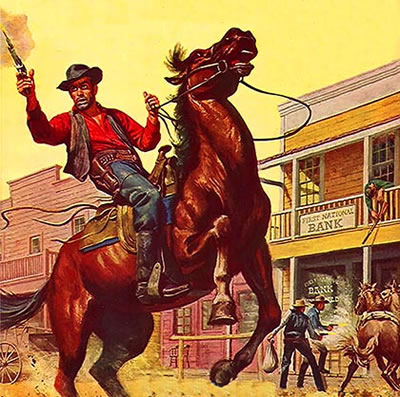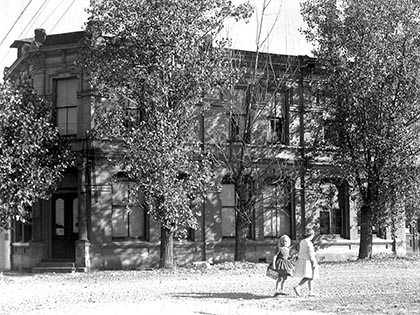JOSEPH, WALLOWA COUNTY; 1890s, 1920s:
Former robber became VP
of bank he once robbed
Audio version: Download MP3 or use controls below:
|

But apparently all the store had in stock was shotguns and bird shot, because instead of taking one of the store's guns, Burton raced to the home of a local named Fred Wagner and asked to use his buffalo rifle — a Winchester Model 1886 chambered in .45-70. Wagner declined. “I know my Winchester better than you,” he said. “I will use it.” And he grabbed it, and stepped into the street. Meanwhile, Tucker was watching all this and starting to panic. “Hurry up!” he shouted. “They are coming with guns!” Grabbing the sack of loot, Brown hustled out of the bank, followed by Fitzhugh, with the group of hostages in front of them to serve as a human shield. Then, from behind the human shield, Wagner opened up on them with his .45-70. The first shot missed. Tucker whipped around with his revolver and fired at the same instant Wagner’s second shot roared out. Tucker’s bullet missed Wagner’s head by an inch or so; Wagner’s bullet plowed into Tucker’s gun hand, sending his pistol flying in a spray of blood and parts that included his trigger finger and his thumb. Wagner jacked the lever on his rifle and fired again. This bullet plowed into Brown’s chest, throwing him down into a sitting position on the bank steps. Seconds later he was dead. Fitzhugh raced back, braving Wagner’s fire, grabbed the bag of loot and sprinted for his horse. Bloodied, disarmed and terrified, Tucker — the future bank vice-president of the bank he’d just helped rob — ran from the scene on foot, leaving his horse behind, an angry and well-armed mob in pursuit. He soon took a charge of bird shot in the side from one of the hardware store’s shotguns, and then a burly blacksmith got the jump on him and he was taken roughly into custody. Meanwhile, Wagner had emptied out the rest of his rifle shooting horses that were tied up nearby, apparently on the theory that one of them was Fitzhugh’s. It wasn’t, and as a result when Fitzhugh was clambering onto his horse and Wagner had a clear shot at him, his rifle was empty. He hustled back to the house for more bullets, but by the time he returned it was all over. Neither Fitzhugh nor the $2,000 was ever seen again.
THE ENTIRE TOWN was shocked by Dave Tucker’s involvement in the robbery; everybody knew him, and almost everybody thought he was a nice young man, a talented stockman with plenty of promise, madly in love with a local girl who was kind of like the Doris Day of Joseph: Minnie Proebstel. A few months later, McCully, the bank teller, went to see him in the jail, and Tucker told his entire story. He’d gotten involved because he wanted enough money to buy a farm and marry Minnie. Minnie also went to see him in the jail. She told him if he’d stand up and take what was coming to him, when he got out of prison, she’d be waiting for him. Well, Tucker drew a six-year prison sentence for his part in the robbery. Four and a half years later, he was out, and moved back to Joseph, and set about slowly winning back the trust and goodwill of the community. He worked hard, saved his money, bought a small flock of lambs, parlayed it into a big one, bought a farm. When he felt he’d rehabilitated himself enough to deserve her, he proposed to Minnie, and she took him up on it. Eventually, in 1928, he made an investment in the First National Bank of Joseph — the institution that had succeeded the First Bank of Joseph, the bank he had robbed 32 years before. And at that point, the bank shareholders cheerfully certified this former bank robber as fully rehabilitated — by electing him vice-president of the bank. And as for Fitzhugh, his name was all but forgotten for decades. But then, around 1940 or so, word came to Joseph from somewhere in Texas that he was being released from prison there, and was he still wanted in Wallowa County? The citizens of Joseph thought about this. Fitzhugh would be in his 70s. The local residents who had participated in the robbery with him — saloonkeeper Martin and stockman and bank executive Tucker — were friends and neighbors and respected citizens now. And the expense of a trial would be more than the total of loot that had been lost from the bank. “Therefore, Fitzhugh was given an opportunity to spend the balance of his life a free man,” McCully’s son wrote. “That responsibility was up to him. Perhaps we will never know his decision.”
|
Background photo is a postcard image showing the summit of Middle Sister, from a picture postcard published around 1950.
Scroll sideways to move the article aside for a better view.
Looking for more?
On our Sortable Master Directory you can search by keywords, locations, or historical timeframes. Hover your mouse over the headlines to read the first few paragraphs (or a summary of the story) in a pop-up box.
... or ...

©2008-2014 by Finn J.D. John. Copyright assertion does not apply to assets that are in the public domain or are used by permission.


